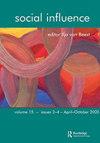当我是对的时候,你就是错的:正确的态度有助于愤怒和对对立个体的接近动机
IF 0.6
3区 心理学
Q3 PSYCHOLOGY, SOCIAL
引用次数: 4
摘要
态度正确和态度清晰定义了更广泛的概念——态度确定性。重复一个人对自己的态度会使态度清晰,而了解大多数人都同意你会使态度正确。目前的研究测试了态度正确如何影响情绪和行为意图对个人持相反态度。我们预测,与清晰度相比,态度正确度高的人会对对立的人感到更愤怒,更渴望与他们对抗、反对和争论。两项研究的结果支持预测;相信自己和大多数人持相同的态度会激发你对持不同观点的人的愤怒。目前的工作有助于我们理解激烈的辩论和丑陋的对抗。本文章由计算机程序翻译,如有差异,请以英文原文为准。
When i’m right you’re wrong: attitude correctness facilitates anger and approach motivation toward opposing individuals
ABSTRACT Attitude correctness and attitude clarity define the broader concept, attitude certainty. Repeating one’s attitude to oneself causes attitude clarity, while learning that the majority of others agree with you causes attitude correctness. The current research tests how attitude correctness influences emotions and behavioral intentions toward individuals with opposing attitudes. We predicted that compared to clarity, those high in attitude correctness would feel more anger toward an opposing individual and a stronger desire to confront, oppose, and argue with them. Results across two studies supported predictions; believing that you hold the same attitude as the majority sparks feelings of anger toward individuals with differing viewpoints. The current work contributes to our understanding of heated debates and ugly confrontations.
求助全文
通过发布文献求助,成功后即可免费获取论文全文。
去求助
来源期刊

Social Influence
PSYCHOLOGY, SOCIAL-
CiteScore
1.50
自引率
0.00%
发文量
4
期刊介绍:
Social Influence is a journal that provides an integrated focus for research into this important, dynamic, and multi-disciplinary field. Topics covered include: conformity, norms, social influence tactics such as norm of reciprocity, authority, scarcity, interpersonal influence, persuasion, power, advertising, mass media effects, political persuasion, propaganda, comparative influence, compliance, minority influence, influence in groups, cultic influence, social movements, social contagions, rumors, resistance to influence, influence across cultures, and the history of influence research.
 求助内容:
求助内容: 应助结果提醒方式:
应助结果提醒方式:


